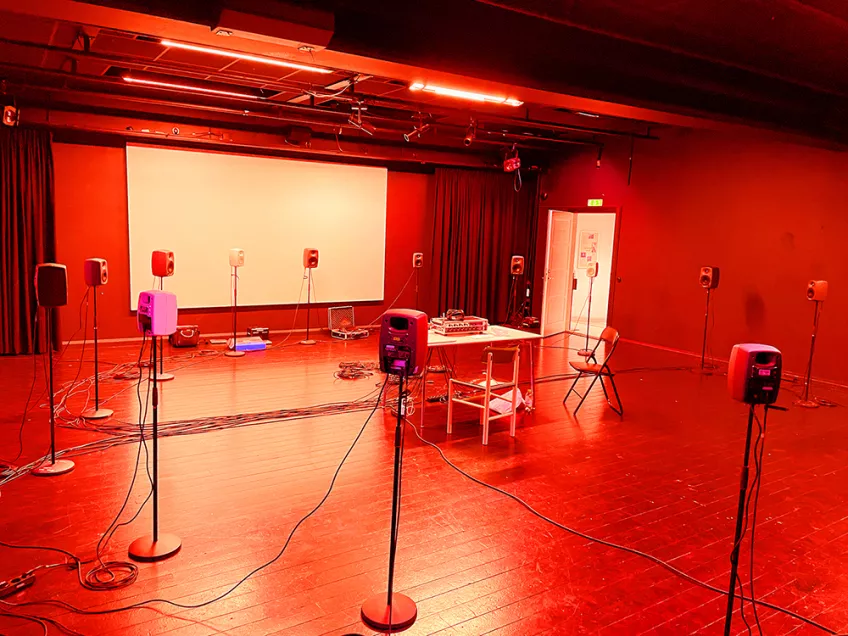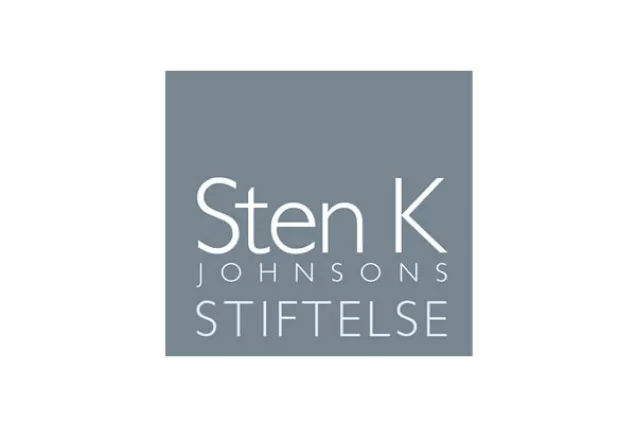Spatial Audio Workshop
Application deadline: 27 May 2024
Spatial audio is currently experiencing a renaissance period through the rise of various extended reality (XR) applications and adoption by mainstream media such as Apple Music, Netflix and major cinema releases. This has occurred alongside rapid spatial audio development within arts, music and gaming applications made possible by increasing processing power, and a proliferation of open source software, sensor-based technologies and spatial audio microphone technologies.
IAC announces a Spatial Audio Workshop during autumn 2024 that will investigate these various strands and associated spatial audio techniques to explore ways of leveraging the potential of spatial audio for creating immersive experiences and opening up new possibilities for listening.
The workshop will take place over three weeks during autumn 2024 where participants will work closely together to try out different spatial audio techniques over both headphones and a multi-speaker Genelec array. During this period, participants will take a deep dive into specific spatial audio techniques, practicing spatial recording techniques, mixing technologies, content delivery and metadata workflows, and distribution formats. Additionally, all participants will get hands on building their own hardware spatial audio controller for integrating into spatial audio post-production and live workflows. The workshop will culminate in participants’ presenting a new spatial audio piece, developed during the workshops, using the hardware controller and/or techniques learned during the period.
The workshops will be led by Sebastian Hastrup and Tim Bishop, both experienced sound designers and engineers focusing specifically on spatial audio. The Spatial Audio Workshop is funded with support from Sten K Johnson Foundation.
Application
We encourage applications from artists, musicians, sound engineers and technicians, as well as others who want to develop their skills and sonic tools to explore spatial audio to apply. This call also extends to filmmakers and game developers who wish to explore the possibilities of sound in building immersive and enveloping environments.
What we need in your application:
- Describe your intention and motivation for why this workshop is interesting and relevant to your work and practice (max. 1 page)
- CV (max. 1 page)
- Relevant links to 3 to 5 work samples, or a pdf portfolio, that represent previous experience and practice with sound and/or immersive practice.
- All application material, except for the work samples, should be gathered in one final pdf document and sent to info [at] iac [dot] lu [dot] se. Title in subject field: Spatial Audio Workshop – application.
The description of your intention and motivation should answer the following questions:
- What questions would you like to explore?
- What professional experience, knowledge, artistic or technical skills could you contribute to the workshop group?
- What do you hope to learn by being a part of the workshop and how would the workshop benefit your practice?
What we look for in your application:
We are interested in applicants who demonstrate an open approach to the myriad of possibilities of spatial audio and have a clear exploratory process to both creative and technical sides of their practice. We also look for finding a good match between participants who will complement each other and foster an open and encouraging dialogue with others.
Structure
The workshop will consist of three full-time weeks (Monday to Friday) during weeks 37, 41 and 45. It is expected that all participants commit to on-site participation during these weeks.
During the workshop participants will learn about the history and current state of spatial audio, as well as hands-on practice with various scene-based and object-based techniques, such as ambisonics, Dolby Atmos, binaural, and VBAP. We will also look at several case studies for working with spatial audio impulse responses, 6DOF experiences and head- and location-tracking systems integration.
Application deadline: Monday, 27 May 2024
Decision announcement: 3 June 2024
Prior knowledge and technical prerequisites
No prior knowledge is required, but, it is expected that participants have some familiarity with using a digital audio workstation such as REAPER, Pro Tools, Logic, Nuendo, Ableton Live or equivalent. Each participant will need their own computer and headphones that can be brought to the workshop sessions.
If you have any questions, please contact: lili [dot] nottrott [at] iac [dot] lu [dot] se (lili[dot]nottrott[at]iac[dot]lu[dot]se).
About the workshop leaders:
Tim Bishop is an artist and spatial audio designer based in Lund. Tim has been working with spatial audio since 2011, across one-to-one performance, audio walks, immersive theatre, VR, 360-filmmaking and multichannel sound installations. His latest work, Sheltered, explored higher-order ambisonic recordings made inside the Arctic Circle, and was experienced by one visitor at a time inside a Polar tent wearing an EEG headband to examine climate change through the affects of our individual thought processes. In addition to his own artistic practice, Tim has worked with spatial audio design on productions with organisations and artists such as Bombina Bombast, IVAR studios, Karlsson & Ryan, Lund University, Malmö Stadsteater, Helena Fernández-Cavada, Skillinge Teater and more. Tim is also a regular teacher on the Virtual Reality and Augmented Reality Master’s Programme at Lund University and was one of the leaders on IAC’s MaxMSP workshop in 2022.
Read more about Tim Bishop here - timbishopartist.com
Sebastian Hastrup is a musician, sound designer, maker and hardware/software engineer based in Malmö. Sebastian also has many years of experience lecturing in media technology and audio production at Blekinge Institute of Technology. Through both his academic and professional career, Sebastian has been developing a variety of skills related to spatial audio - from interactive location based binaural applications and multichannel audio installations to traditional film production in 5.1 and Dolby Atmos. Sebastian is also the founder and sole developer at Sebsongs Modular, a small Eurorack synth module company. Recently he has been involved with the Kalaudioskop project in collaboration with Malmö Live, Axis and others to develop methods for spatial reproduction of the Malmö Symphony Orchestra.

